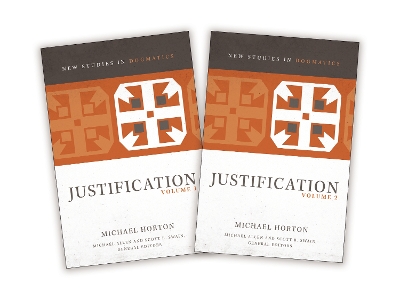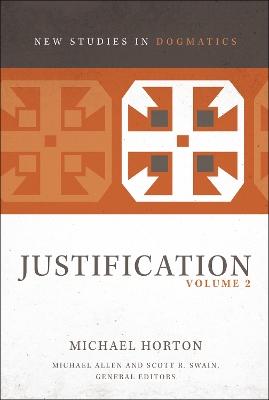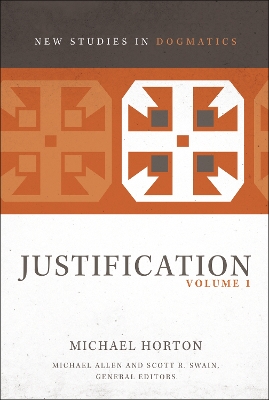New Studies in Dogmatics
3 total works
A two-volume project delving into the doctrine of justification. Michael Horton seeks not simply to recover a clear message of its role in modern Reformed theology, but also to bring a fresh discovery of the gospel in a time when contemporary debates around justification have reignited.
The doctrine of justification stands at the center of our systematic reflection on the meaning of salvation and grace as well as our piety, mission, and life together. And yet, within mainline Protestant and evangelical theology, it's often taken for granted or left to gather dust in favor of modern concerns of self-renewal.
Volume 1 is an exercise in historical theology, exploring the doctrine of justification from the patristic era to the Reformation:
- Providing a map for contemporary discussions of justification, identifying and engaging principal sources: Origen, Chrysostom, Augustine, Thomas Aquinas, John Duns Scotus, William of Ockham, Gabriel Biel, and the magisterial reformers.
- Studying the transformations of the doctrine through Aquinas, Scotus and the nominalists leading up to the era of the Reformation and the Council of Trent.
- Examining the hermeneutical and theological significance of the Reformers' understanding of the law and the gospel and the resultant covenantal scheme that became formative in Reformed theology.
Volume 2 embarks on the theologically constructive task of investigating the biblical doctrine of justification in light of contemporary exegesis. Taking up the topic from a variety of theological vantage points, Horton engages with contemporary debates in biblical, especially Pauline, scholarship.
- Part 1 draws out The Horizon of Justification from the Old Testament narratives of Adam and Israel.
- Part 2 defines The Achievement of Justification in the blood of Christ and seeks to lay the groundwork for understanding its extent.
- Part 3 focuses on The Gift of Righteousness, delving into a clear articulation of what justification means, its mechanism, and the role of works on the day of judgement.
- Part 4 proposes a way forward for Receiving Justification and understanding faith and justification within the broader framework of union with Christ.
Engaging and thorough, Justification, Vol 1 & 2 will not only reenergize the reader—whether Protestant or Catholic—with a passion for understanding this essential and long-running doctrinal conversation, but also challenge anyone to engage critically with the history of the Church and the heart of the gospel.
The second of a two-volume project delving into the doctrine of justification. Michael Horton seeks not simply to recover a clear message of its role in modern Reformed theology, but also to bring a fresh discovery of the gospel in a time when contemporary debates around justification have reignited.
The doctrine of justification stands at the center of our systematic reflection on the meaning of salvation and grace as well as our piety, mission, and life together. And yet, within mainline Protestant and evangelical theology, it's often taken for granted or left to gather dust in favor of modern concerns and self-renewal.
Volume 2 embarks on the theologically constructive task of investigating the biblical doctrine of justification in light of contemporary exegesis. Taking up the topic from a variety of theological vantage points, Horton engages with contemporary debates in biblical, especially Pauline, scholarship.
- Part 1 draws out The Horizon of Justification from the Old Testament narratives of Adam and Israel.
- Part 2 defines The Achievement of Justification in the blood of Christ and seeks to lay the groundwork for understanding its extent.
- Part 3 focuses on The Gift of Righteousness, delving into a clear articulation of what justification means, its mechanism, and the role of works on the day of judgement.
- Part 4 proposes a way forward for Receiving Justification and understanding faith and justification within the broader framework of union with Christ.
Engaging and thorough, Justification shows that the doctrine of justification finds its most ecumenically significant starting point and proper habitat in unity with Christ, where the greatest consensus, past and present, is to be found among Orthodox, Roman Catholic, and Protestant theologies.
The first of a two-volume project delving into the doctrine of justification. Michael Horton seeks not simply to recover a clear message of its role in modern Reformed theology, but also to bring a fresh discovery of the gospel in a time when contemporary debates around justification have reignited.
The doctrine of justification stands at the center of our systematic reflection on the meaning of salvation and grace as well as our piety, mission, and life together. And yet, within mainline Protestant and evangelical theology, it's often taken for granted or left to gather dust in favor of modern concerns and self-renewal.
Volume 1 is an exercise in historical theology, exploring the doctrine of justification from the patristic era to the Reformation. This book:
- Provides a map for contemporary discussions of justification, identifying and engaging principal sources: Origen, Chrysostom, Augustine, Thomas Aquinas, John Duns Scotus, William of Ockham, Gabriel Biel, and the magisterial reformers.
- Studies the transformations of the doctrine through Aquinas, Scotus and the nominalists leading up to the era of the Reformation and the Council of Trent.
- Concludes by examining the hermeneutical and theological significance of the Reformers' understanding of the law and the gospel and the resultant covenantal scheme that became formative in Reformed theology.
Engaging and thorough, Justification will not only reenergize the reader—whether Protestant or Catholic—with a passion for understanding this essential and long-running doctrinal conversation, but also challenge anyone to engage critically with the history of the Church and the heart of the gospel.


